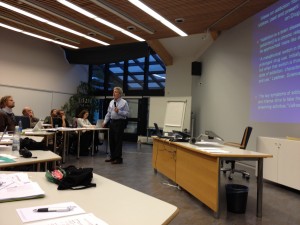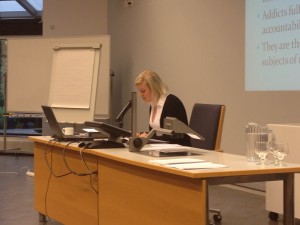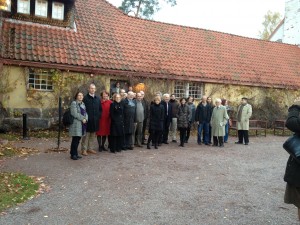The CEACGarranged the conference “Addiction: What’s the added value of the concept today?” in Majvik, Finland, October 15th-17th 2012. The meeting gathered researchers from different disciplines and traditions in order to discuss the ways in which the phenomenon can be understood in view of the knowledge available. What does the concept of addiction contribute with? Why is it useful or insufficient?
Throughout the conference the discussion was lively and many different aspects were pondered. Historical, popular, philosophical, sociological, political, neurobiological and cultural aspects of the phenomenon were mixed in the program sessions so that the different perspectives would be represented throughout the discussions. The meeting programme can be viewed here.
Gene Heyman (picture below) held one of the introductory keynote speeches, in which he pointed out what is known about choice in addictive behaviour and about making decisions to quit. How does the disease model’s use of the concept fit with this knowledge? View Heyman’s power point presentation here.

Philosophical discussions on the concept touched upon similar aspects. Finnish philosopher Susanne Uusitalo (pictured below) pointed out the importance of a moral accountability model in the context of recovery.

What is the limitation of neuroscientific knowledge of addiction processes, and which type of contributions does brain research offer the field of addiction research and practice? This question was critically discussed both by neuroscientist Esa Korpi and professor Harold Kalant. See the latter presentation here.
For people interested in the papers and presentations from the meeting, they are available in a password protected area of this web page. Please, contact Matilda Hellman (matilda.hellman@helsinki.fi) in case you are interested in viewing them.
The meeting was a thematic meeting of the Kettil Bruun Society. These meetings are small parallel tracks to the yearly conference event, typically initiated by society members. The meeting was sponsored by the Helsinki Collegium for Advanced Studies, The Federation of Finnish Learned Societies, the Finnish Foundation for Alcohol Studies and Nordic Centre for Welfare and Social Issues (Alcohol and drug research unit)
The participants of the conference are planning a thematic publication (thematic journal issue) on the basis of the presentations and papers of the meeting.




